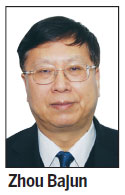Be more open-minded to economic integration
Updated: 2014-05-14 06:25
By Zhou Bajun(HK Edition)
|
|||||||||
Hong Kong is the most open economy in the world with the least restrictions on capital movements and foreign trade. Significantly, Hong Kong's economic relations with the mainland have grown enormously over the past three decades. While economic integration between Hong Kong and the mainland has progressed in recent years, hostility toward the mainland has also revealed its ugly face. Thankfully, the city's trade links with other economies have remained more or less the same. But this negative attitude to the mainland suggests some Hongkongers are not as open-minded as they want others to believe.
It seems some Hong Kong residents have a problem separating the city's economic relationship with the mainland from political issues. Those who are completely sold on the Western political system cannot see that increased economic interaction across the Shenzhen River must also include political integration. Therefore, they support the local opposition's attempts to undermine economic integration and turn the HKSAR into an independent political entity.
There is a certain irony about this. For example, it's well-known Hong Kong has long been an entrepot between the mainland and the rest of the world. But recently the SAR government yielded to popular pressure and imposed heavy curbs on exporting of baby formula - especially re-exports to the mainland. Instead, the authorities should have encouraged traders to enlarge the entrepot trade of baby formula, legally. Their restrictive moves were widely seen as a victory for the so-called "locals first" campaign at the expense of parallel traders. But it also means the huge demand on the mainland for baby formula imported through Hong Kong is largely being untapped.

Worse still is that politically motivated efforts to undermine Hong Kong's economic relations with the mainland have affected some locals' opinions of mainlanders. This has led to negative behavior, sometimes expressed on a personal level.
Last month, a video clip showing a visiting mainland couple and two Hong Kong locals arguing after the couple let their child urinate in street in Mong Kok set off a fierce online war of words between Hong Kong and mainland netizens. It further poisoned the already toxic atmosphere of social commentary. The episode comes after the street antics of a small group of locals, who paraded in Tsim Sha Tsui a few months ago in a display of their resentment toward mainland visitors. They described the mainland visitors as "locusts".
The animosity some locals showed was worse this time in that they also vented it on fellow Hongkongers who disagreed with them. This was evident in the disgusting act of sending three parcels of human feces to the office and home of Secretary for Commerce Greg So Kam-leung, after So called for more tolerance from Hong Kong people.
Since the Closer Economic Partnership Arrangement (CEPA) was signed in 2003 tourist numbers from the mainland have increased massively - especially under the Individual Visit Scheme (IVS). A local official source said annual tourist visits jumped from 16.6 million in 2002 to 54.3 million in 2013. Of these, 75 percent came from the mainland and about 67 percent were under the IVS. Consequently, in Hong Kong the number of shops selling cosmetics and personal-care products has surged by 1,500 percent from 90 to 1,440; clothing and footwear shops increased by 42 percent to 15,410 and jewelry and watch shops by 31 percent to 3,850 in the past 10 years. In 2004, mainland tourists spent HK$27 billion and in 2013, the total rose to HK$170 billion. This accounted for one-third of the total value of the city's annual retail sales. The visitors under the IVS spent HK$8.62 billion in 2004 and HK$110 billion in 2013 - an increase of 11.7 times. On the other hand, Hong Kong residents accounted for almost 80 percent of the HK$191.6 billion in consumer spending, compared with about 14 percent by mainland visitors in 2004. Ten years later, the locals' share has dropped to 62 percent while that of mainlanders rose to almost 35 percent.
A growing number of mainlanders touring Hong Kong will inevitably have a social impact on the local community. This is particularly so in the use of public transport, tourist attractions and recreational facilities. The SAR government is partly to blame for this. It failed to acknowledge the emotional element when assessing the city's ability to receive so many mainland visitors in such a short period. Some commentators have urged the government to learn from the European Union, which has introduced a "social carrying capacity" system for tourist handling perimeters. This is in response to limits on local residents' tolerance towards visitors and adjusts the inflow accordingly.
Hong Kong is a relatively small but very open economy. Although globalization has slowed since the latest international financial crisis the city continues to thrive due to its openness. The global economic center of gravity is shifting from the West to the East. Hong Kong's future depends on the mainland more than some people realize. If Hong Kong lets politics harm its economic relationship with the mainland, it will lose much of its productivity as well as its appeal to foreign investors. Hong Kong people, who cannot see this, need to wake up and become more open-minded.
The author is a veteran current affairs commentator.
(HK Edition 05/14/2014 page9)